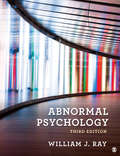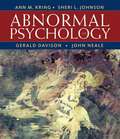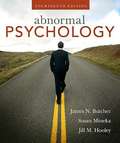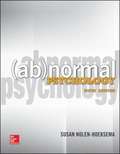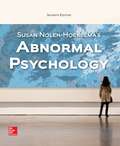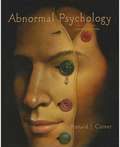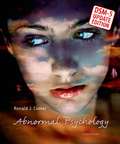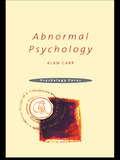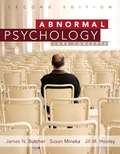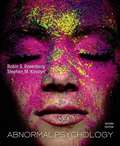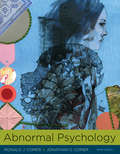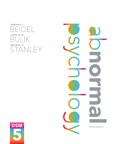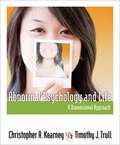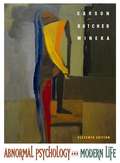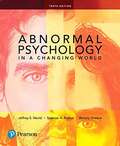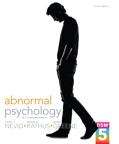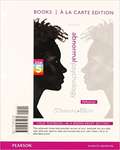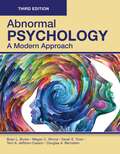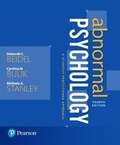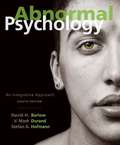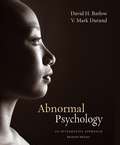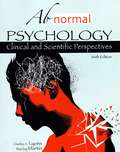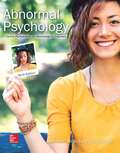- Table View
- List View
Abnormal Psychology
by William J. RayIn Abnormal Psychology, best-selling author William J. Ray brings together current perspectives concerning the manner in which the human mind, behavior, and experience can be understood. In addition to the traditional psychological literature, this book draws from work in the cognitive and affective neurosciences, epidemiology, ethology, and genetics. Ray focuses on unifying and integrating the biopsychosocial understandings of human behavior within a broader consideration of human culture and language as it applies to abnormal psychology. With coverage of DSM–5, ICD–11, and RDoC, the fully revised Third Edition puts even greater emphasis on the range of human experiences and medical comorbidities and includes additional references to representations of mental health in popular culture to connect readers with familiar examples. This title is accompanied by a complete teaching and learning package.
Abnormal Psychology
by William J. RayIn Abnormal Psychology, best-selling author William J. Ray brings together current perspectives concerning the manner in which the human mind, behavior, and experience can be understood. In addition to the traditional psychological literature, this book draws from work in the cognitive and affective neurosciences, epidemiology, ethology, and genetics. Ray focuses on unifying and integrating the biopsychosocial understandings of human behavior within a broader consideration of human culture and language as it applies to abnormal psychology. With coverage of DSM–5, ICD–11, and RDoC, the fully revised Third Edition puts even greater emphasis on the range of human experiences and medical comorbidities and includes additional references to representations of mental health in popular culture to connect readers with familiar examples. This title is accompanied by a complete teaching and learning package.
Abnormal Psychology (12th Edition)
by Ann M. Kring John M. Neale Gerald C. Davison Sheri JohnsonAbnormal Psychology 12th Edition, continues the tradition of giving students the opportunity to explore the latest theories and research in the field. It has been adapted to take into account UK/European examples in diagnosis and classifcation of mental illness, statistics on misuse of drugs and treatment as well as a fully revised chapter with European examples on legal and ethical issues. As distinguished scholars and leaders in the field of Psychology, our author team continues to emphasize recent and comprehensive research coverage that has been the hallmark of the text. Significant new material correlated to the forthcoming Diagnostic and Statistical Manual of Mental Disorders 5 (DSM-5), included in every chapter. Abnormal Psychology emphasizes an integrated approach, showing how psychopathology is best understood by considering multiple perspectives, and how these varying perspectives can provide us with the clearest accounting of the causes of these disorders as well as the best possible treatments. Created for the 11th edition, we continue to offer a powerful video series for your Abnormal Psychology course with 7-10 minute clips to show in class or for students to review outside of class to help understand the patients experience. Unlike other videos, these feature real patients' and their families, in the context of their lives, describing symptoms from their own perspective. Each video provides concise information about the available treatment options.
Abnormal Psychology (14th edition)
by James N. Butcher Susan Mineka Jill M. HooleyThis distinguished book is considered the most comprehensive in its field, and the author team includes the most preeminent and respected researchers in abnormal psychology today. The new 14th edition introduces a striking new design, new topics, fresh insights, streamlined writing, and a sharper focus on research in psychopathology.
Abnormal Psychology (6th Edition)
by Susan Nolen-HoeksemaNow updated to reflect the DSM-5, Susan Nolen-Hoeksema's, Abnormal Psychology blends cutting-edge research in psychopathology with compassion for people who suffer from psychological disorders and captures the excitement of major advances in biological and psychosocial research and treatment alternatives. The new sixth edition continues to place an emphasis on an integrated approach to abnormal psychology, on making biological information clear to students, and on providing a strong focus on empirical research and diversity.
Abnormal Psychology (7th Edition)
by Susan Nolen-Hoeksema Brett MarroquinThe seventh edition of Susan Nolen-Hoeksema's Abnormal Psychology continues her mission to create a program that blends the most contemporary research on psychological disorders with compassion for those who live with these disorders.
Abnormal Psychology (7th Edition)
by Ronald J. ComerEach new edition of Ronald Comer's Abnormal Psychology has offered a fresh, comprehensive, and exciting presentation of the field, with objective, balanced coverage of a wide range of theories, studies, disorders, and treatments and all major models. Each new edition has also integrated the latest in pedagogical tools and state-of-the-art media for students and instructors. But even by Comer's standards, the new edition of Abnormal Psychology is an exceptional revision that captures the way the field has changed, the world has changed, and students have changed. The beautifully redesigned new edition features more than 2,000 new references from the years 2006-2009; hundreds of new photos, tables, and figures; and expanded coverage of multicultural issues, cognitive theories and treatments, and neuroscience topics. There has never been a text for the course so well-attuned to both the field of abnormal psychology and the wide range of students exploring it.
Abnormal Psychology (Eighth Edition)
by Ronald J. ComerAn inspiring and clearly written graduate textbook with psychology concepts explained in a way easy to comprehend with updates on DSM-5.
Abnormal Psychology (Psychology Focus Ser.)
by Alan CarrThis book presents a clear and in-depth account of abnormal psychology. It focuses on both clinical descriptions, using illustrative case studies at the beginning of each section, and on the implications of the major theoretical perspectives and relevant empirical evidence for clinical treatment. It provides a very readable and up-to-date review of topics including childhood behaviour disorders, anxiety, depression, schizophrenia, personality disorders and models of abnormal behaviour. Alan Carr illustrates a scientific approach to the understanding of these aspects of abnormal psychology. Both the content and style of this book will help students understand a complex area of psychology.
Abnormal Psychology (Second Edition)
by James N. Butcher Susan Mineka Jill M. HooleyThe book presents the fundamentals of abnormal psychology and offers the most thoroughly researched and up-to-date explanation of psychopathology today.
Abnormal Psychology (Second Edition)
by Robin S. Rosenberg Stephen M. KosslynThis is an exciting time to study psychopathology. Research on the entire range of psychological disorders has blossomed during the last several decades, producing dramatic new insights about psychological disorders and their treatments.
Abnormal Psychology (Sixteenth Edition)
by James N. Butcher Jill M. Hooley Susan M. MinekaThe most authoritative and comprehensive text in Abnormal Psychology, now with DSM-5 coverage throughout. The esteemed author team of Jim Butcher, Jill Hooley, and Sue Mineka offers students the most thoroughly researched, engaging, and up-to-date explanation of psychopathology, creating a learning experience that provokes thought and increases awareness. By adopting a comprehensive bio-psycho-social perspective, this text takes students to levels of understanding that other books do not offer. The 16th edition of Abnormal Psychology reflects the revision of the Diagnostic and Statistical Manual (DSM-5). Hundreds of new references have been added to reflect the ever-changing field of abnormal psychology. MyPsychLab is an integral part of the Butcher / Mineka / Hooley program. Key learning applications include MyPsychLab video series with new virtual case studies. Teaching & Learning Experience Personalize Learning - MyPsychLab is an online homework, tutorial, and assessment program. It helps students prepare for class and instructor gauge individual and class performance. Explore Research - The authors present their diverse research interests in an exciting way that provokes thought and increase awareness. Improve Critical Thinking - Review questions at the end of major sections within the chapters provide opportunities for self-assessment and reinforce learning. Engage Students - Most chapters begin with a Case Study to engage students' attention right from the outset. Support Instructors - A full set of supplements, including MyPsychLab, provides instructors with all the resources and support they need. Note: MyPsychLab does not come automatically packaged with this text. To purchase MyPsychLab, please visit: www. mypsychlab. com or you can purchase a ValuePack of the text + NEW MyPsychLab: ValuePack ISBN-10: 0205965091 / ValuePack ISBN-13: 9780205965090 This Book a la Carte Edition is an unbound, three-hole punched, loose-leaf version of the textbook and provides students the opportunity to personalized their book by incorporating their own notes and taking the portion of the book they need to class - all at a fraction of the bound book price.
Abnormal Psychology (Tenth Edition)
by Ronald J. Comer Jonathan S. ComerAn award-winning teacher, accomplished researcher, and experienced therapist, Ron Comer knows how to communicate the complexities of the abnormal psychology, to speak to the concerns of students, and to portray the real human impact of psychological disorders. For the 10th edition of this market leading textbook, Ron is joined by Jonathan Comer who brings his special expertise in developmental psychopathology research, brain circuitry, cognitive-behavioral research, and technology-driven treatment. <p><p> With its signature integrated coverage of theory, diagnosis, and treatment, and remarkably inclusive cross-cultural perspective, this new edition of Comer’s widely adopted textbook shows students where the study and treatment of psychological disorders stand today. In addition to a thorough updating, the new edition employs some extraordinary interactive tools to bring students face to face with the realities of psychological dysfunction, organized for easy access and assignability in LaunchPad, Worth Publishers’ breakthrough online course space.
Abnormal Psychology (Third Edition)
by Deborah C. Beidel Cynthia M. Bulik Melinda A. StanleyThis leading-edge author team, consisting of three active researchers, clinicians, and educators, take a scientist-practitioner approach emphasizing the rich blend of both the science and practice of abnormal psychology throughout the text. The developmental trajectory of each condition is discussed where appropriate and scientific findings with respect to race and gender are incorporated into discussions about each condition. Biological findings are integrated with findings from social and behavioral sciences, highlighting the complexity of abnormal behavior and how it is often influenced by a wide range of variables. The authors encourage students to look at psychological disorders along a continuum and analyze disorders in terms of whether the individual's behavior creates distress or impairs daily functioning. Importantly, an effort is made to "bring to life" the nature of these conditions by providing vivid clinical descriptions. In addition to short descriptions used liberally throughout each chapter, a fully integrated case study is presented at the end of each chapter, again illustrating the interplay of biological, psychosocial and emotional factors. The 3rd edition includes coverage of the Diagnostic and Statistical Manual (DSM-5), with updated text references and examples throughout. MyPsychLab is an integral part of the Beidel / Bulik / Stanley program. Key learning applications include MyPsychLab video series with new virtual case studies.
Abnormal Psychology and Life: A Dimensional Approach
by Christopher A. Kearney Timothy J. TrullChris Kearney and Tim Trull's ABNORMAL PSYCHOLOGY AND LIFE: A DIMENSIONAL APPROACH provides students with a concise, contemporary, science-based view of psychopathology that emphasizes the individual first and the disorder second. Through consistent pedagogy featuring clinical cases and real first-person narratives, the text illuminates our understanding that abnormal behavior--rather than being either present or absent--exists in everyone to some degree on a continuum from normal to pathological. By highlighting this widely accepted dimensional view--which places the behavior of an individual at the forefront of clinical assessment, prevention, definition, and treatment--the text's goal is to encourage students to become intelligent consumers of mental health information. With its emphasis on assessment and treatment as well as prevention, the book gives students the tools necessary to understand the precursors of abnormal behavior, overcome the stigma associated with it, and identify the real people classified as exhibiting it.
Abnormal Psychology and Modern Life (11th Edition)
by Susan Mineka Robert C. Carson James Neal ButcherThis book has been providing an introduction to abnormal psychology since 1948 and remains the most authoritative survey of abnormal psychology, known for its comprehensiveness, balance of theory and practice, strong research base, and clinical sensitivity. Well-known authors Bob Carson and Jim Butcher have been authoring this book since the 6th edition in 1980 and renowned researcher Sue Mineka came onboard with the 10th edition in 1996. The focus of the 11th edition has been to retain the authoritative overview of contemporary and classic research within a more accessible framework. Features supporting this aim include Updated Research, Integrated Multicultural and Cross-Cultural Research, Accessible Organization, Highlight sections, Unresolved Issues sections, and Case Studies. The organization of Abnormal Psychology and Modern Life has to a large extent set the standard for the study of abnormal psychology.
Abnormal Psychology in a Changing World
by Jeffrey S. Nevid Spencer A. Rathus Beverly GreenePut a human face on the study of abnormal psychology Abnormal Psychology in a Changing World makes complex abnormal psychology concepts accessible and stimulating to students. Authors Jeffrey Nevid, Spencer Rathus, and Beverly Greene present illustrative case examples drawn from their own clinical and teaching experiences, leading students to recognize the human dimension of the study of abnormal psychology. Updated to reflect the latest advancements in the field, the Tenth Edition highlights the ways in which personal technology is changing the study of abnormal psychology via the new Abnormal Psychology in the Digital Age feature. Available to package with Abnormal Psychology in a Changing World, Tenth Edition, MyLab™ Psychology is an online homework, tutorial, and assessment program designed to work with this text to engage students and improve results. MyLab Psychology is ideal for courses requiring robust assessments. Abnormal Psychology in a Changing World, Tenth Edition is also available via Revel™, an interactive digital learning environment that replaces the print textbook, enabling students to read, practice, and study in one continuous experience. Revel is ideal for courses where student engagement and mobile access are important. Note: You are purchasing a standalone product; MyLab does not come packaged with this content. Students, if interested in purchasing this title with MyLab, ask your instructor for the correct package ISBN and Course ID. Instructors, contact your Pearson representative for more information.
Abnormal Psychology in a Changing World
by Jeffrey S. Nevid Spence A. Rathus Beverly S. GreeneAbnormal Psychology in a Changing World, 9/e uses first-person narratives from people struggling with psychological disorders as a pedagogical framework. Updated to reflect the revision of the Diagnostic and Statistical Manual (DSM-5), the authors endeavor to bring research developments and advancements in abnormal psychology to students. Through illustrative case examples drawn from the authors' own experiences, they recognize there is a human dimension to the study of abnormal psychology.
Abnormal Psychology, Eighth Edition
by Thomas F. Oltmanns Robert E. EmeryAbnormal Psychology, 8/e brings both the science and personal aspects of abnormal psychology to life with a focus on evidence-based practice and emerging research. Authors Thomas F. Oltmanns and Robert E. Emery present the most cutting edge information on abnormal psychology by covering methods and treatment in context. Organized around the way students learn, this title helps readers understand the biological, psychological, and social perspectives of abnormal psychology. The 8th edition has been updated to include DSM-5 information throughout. The authors have integrated DSM-5 into the fabric of every chapter in a thorough, critical way, helping readers think critically about these changes and discuss the pros and cons of the DSM diagnostic systems.
Abnormal Psychology: A Modern Approach, Third Edition (paperback-b/w)
by Brian Burke Douglas Bernstein Sarah Trost Terri DeRoon-Cassini Megan WronaABNORMAL PSYCHOLOGY: A MODERN APPROACH THIRD EDITION
Abnormal Psychology: A Scientist-Practitioner Approach
by Deborah C. Beidel Cynthia M. Bulik Melinda A. StanleyAbnormal Psychology: A Scientist-Practitioner Approach portrays the human face of various psychological conditions, helping students to understand that abnormal behavior is complex and subject to many different forces. Authors Deborah Beidel, Cynthia Bulik, and Melinda Stanley -- all active researchers, clinicians, and educators -- bring abnormal psychology to life via a scientist--practitioner approach that integrates biological data with research from the social and behavioral sciences. The Fourth Edition offers expanded coverage of disorders emphasized in the DSM-5, as well as discussions of contemporary issues that foster student interest.
Abnormal Psychology: An Integrative Approach
by David Barlow Stefan Hofmann V. DurandBalancing biological, psychological, social, and cultural approaches, this book's ground-breaking integrative approach is the most modern, scientifically valid method for studying abnormal psychology. Updated with leading-edge research findings, the eighth edition draws on the expertise of David H. Barlow, V. Mark Durand, and Stefan G. Hofmann, three internationally recognized experts in clinical psychology. <p><p> In ABNORMAL PSYCHOLOGY: AN INTEGRATIVE APPROACH, the authors successfully blend sophisticated research with an accessible, engaging writing style. They go beyond simply describing different schools of thought on psychological disorders, exploring the interactions of the various forces that contribute to psychopathology. This comprehensive resource includes integrated case studies (95 percent from the authors' own files) and additional study tools.
Abnormal Psychology: An Integrative Approach (Seventh Edition)
by David H. Barlow V. Mark DurandBalancing biological, psychological, social, and cultural approaches, David Barlow and V. Mark Durand's groundbreaking integrative approach is the most modern, scientifically valid method for studying abnormal psychology. In this Seventh Edition of their proven ABNORMAL PSYCHOLOGY: AN INTEGRATIVE APPROACH, Barlow and Durand successfully blend sophisticated research and an accessible writing style with the most widely recognized method of discussing psychopathology. Going beyond simply describing different schools of thought on psychological disorders, the authors explore the interactions of the various forces that contribute to psychopathology. A conversational writing style, consistent pedagogical elements, integrated case studies (95 percent from the authors' own files), video clips of clients, and additional study tools make this text the most complete learning resource available.
Abnormal Psychology: Clinical & Scientific Perspectives
by Barclay Martin Charles LyonsThe United States spends more money on mental disorders than on any other health condition, with heart disease and cancer trailing far behind. As important as that statistic is, it is not the main reason that it is incumbent upon us to understand more about these conditions. We all have friends or family members who have battled with mental health in some way. It is therefore important to learn what we can about mental disorders, including how they are identified, how they develop, how they can be treated, and, ultimately, how they can be prevented. <p><p> As in the previous editions of Abnormal Psychology: Clinical and Scientific Perspectives, this sixth edition was prepared with the goal of producing a readable, useful, inexpensive referenced resource that could serve as a primary text for students in undergraduate abnormal psychology courses. It provides a thorough (and critical) overview of the official system for classifying mental disorders - the Diagnostic and Statistical Manual of Mental Disorders, Fifth Edition (DSM-5) - describing the many ways in which the DSM-5 differs from its predecessors. As this text reviews both past and present treatment approaches and their supporting research, it also encourages students to think critically and to evaluate the strength of evidence.
Abnormal Psychology: Clinical Perspectives on Psychological Disorders
by Susan Krauss WhitbournePresenting the human side of Psychological Disorders. Susan Krauss Whitbourne's Abnormal Psychology: Clinical Perspectives on Psychological Disorders, shows students real-life portrayals of psychological disorders through an extensive use of clinical and online case studies, biographies, and first-person quotations. The program maintains the biopsychosocial approach, incorporating biological, psychological, and sociocultural contributions to psychological disorders, also acknowledging the evolution of psychological disorders over the lifespan. The ninth edition ties concepts together with an integrated, personalized learning program, providing students the insight they need to study smarter and improve performance.
